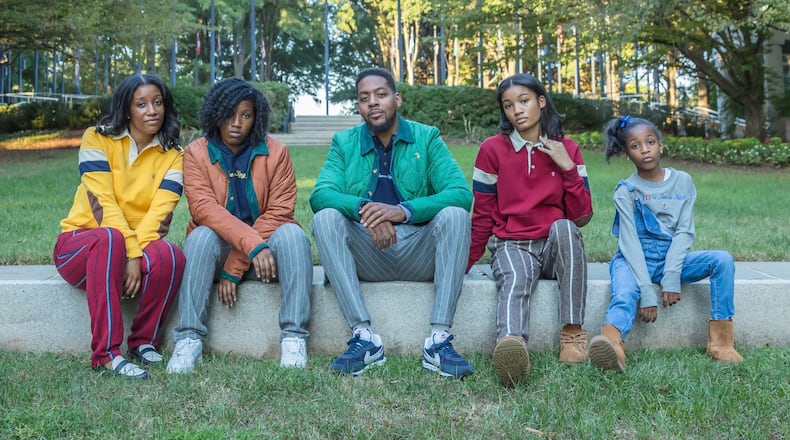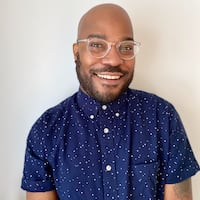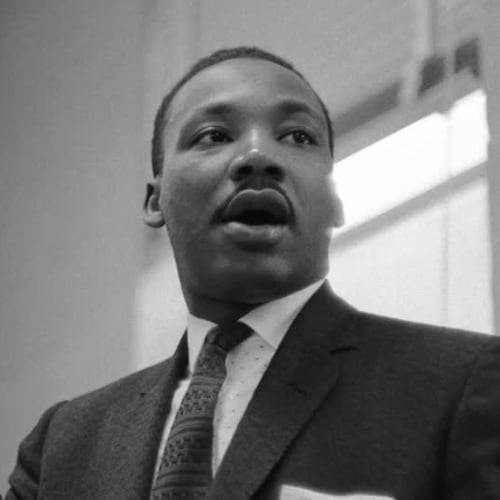The thought of using his fashion line to show love for Atlanta had been on Quintin Crumpler’s mind for a while.
The fashion designer is a product of metro area. It’s where he is raising his four children. It’s where he founded and is building his prep, sportswear and tailoring line Goat by James King. The brand, founded in 2018, is a nod to his middle name, royal disposition in the Black community and being the best at what you do. So, when it came time to plan his 2023 spring collection, Crumpler included a crewneck with brand’s name embroidered on the chest, and “Atlanta” just below.
For the emerging Black-owned brand’s creator, the subtle nod to home sends a message.
“People probably would look at that and be like, well, ‘I’m not from Atlanta, why would I wear it?’ Other fashion cities — New York, Los Angeles, Paris — do it. It’s me consciously trying to establish that Atlanta is serious about fashion,” Crumpler said.
Whereas Atlanta is a fashionable city, it’s not synonymous with fashion. Yet, like the city‘s rise to becoming the hip-hop epicenter, Black and brown designers are bringing global attention to local catwalks. Like their predecessors, homegrown talents and transplants are finding success outside the Perimeter, but are still challenged by a lack of representation, funding and exposure.
“If you look at the music, even when OutKast came out first, they were getting booed, but they just didn’t understand our point of view,” Crumpler said. “I think that’s the same culturally here as it relates to fashion.”
Credit: Courtesy of Goat by James King
Credit: Courtesy of Goat by James King
‘A movement of Black designers’
Kenya Freeman has seen this current boom of Black fashion designers before. The womenswear designer behind Sylvia Mollie Collections came to Atlanta in 1998 when Black fashion was heavy on Afrocentric brands like Cross Colours and asymmetric haircuts. Coming from Norfolk, Virginia, Freeman remembers Timberland boots being swapped out for Reebok Classics.
Freeman was studying fashion design at American Intercontinental University. In the industry, there was a rise of Black-owned design brands heavily influenced by hip-hop culture including Phat Farm, Baby Phat, RP55, as well as lines from rappers Missy Elliott and Eve. “It was just a movement of Black designers,” she remembers. “When you actually see that representation in your face and then you’re like I can do exactly what they’re doing on my own terms because they’ve already done it.”
Credit: Courtesy Slyvia Mollie
Credit: Courtesy Slyvia Mollie
It’s happening again in Atlanta. Before the Internet started fawning over “Next in Fashion” darling Nigel Xavier — and rightfully so — names with local connections such as the late Mychael Knight, Tracy Nicole Clothing, F&W Style, Original Fani, Honor Roll Clothing, Mifland and Chilly-O Culture Co. were generating buzz at home and overseas.
In 2016, Freeman was a finalist on season 16 of “Project Runway.” Her line focuses on plus-size wear, and makeup for women. She’s landed collaborations with retail giants Torrid and Shein. Atlanta’s spirit of celebrating Black individuality drives a lot of what she sees in the current crop of successful designers. “We create our own rules when it comes to fashion. We’re okay with mixing the stripes and the polka dots and the neons with the grays and the black — all of that.”
Others see it, too.
“They’re disrupting,” said Courtney Hammonds, a fashion educator and historian who grew up on hip-hop culture and used to make custom jeans with Andre 3000. He sees himself in them. “They’re taking things and pushing the limits, but being able to have a unique voice.”
Credit: Courtesy Alani Taylor
Credit: Courtesy Alani Taylor
Freedom to disrupt the industry drove celebrity designer Timeekah “Murph” Murphy to start dabbling in fashion while still serving in the military. “I just started teaching myself how to sew just because I didn’t want to look like everybody else,” said the New Jersey native whose unisex line, Alani Taylor, is named for her daughter and based in Atlanta.
Murphy identifies as masculine female, but didn’t see that represented in clothing options for Black women. By the time Murphy moved to Atlanta three years ago, she had a client list that included Beyonce, Cardi B and Megan Thee Stallion. Murphy is also the owner and CEO of The Lab, a manufacturing and creative space in Atlanta geared toward designers of color.
Murphy says Atlanta’s Black design talent is evident for professionals, but not for casual consumers. “It’s definitely here, but it’s so spread out that it looks thin to everybody else,” she said.
‘That same energy’
Since 2006, Angela Watts has worked to bring more eyes to Atlanta’s Black fashion community, hosting fashion shows and other events. Watts is the founder of Atlanta Fashion Week (ATLFW), as well as Ragtrade Atlanta, an agency that offers opportunities for designers of color. Though it’s existed in some form since 2014, ATLFW officially partnered with the City of Atlanta Mayor’s Office of Film and Entertainment in October 2019.
With a background in public relations and marketing, Watts understands the value of bringing more exposure to minority-owned brands. “I feel like the fashion industry has historically struggled with DEI and that makes it challenging for Black designers to gain that visibility based on their skillset and presentation,” she said.
Freeman agrees. “That’s even less for a Black brand specializing in plus-size clothing,” she said. “The funding doesn’t go to Black girls that look like me.”
Fortunately, Watts says, there are opportunities emerging for Black designers. Shops such as Moda 404, Georgio’s, Wish, Versus ATL, Closette and The Village Retail feature designers of color.
As Black man pushing a line with classic prep elements, Crumpler is used to his approach being called different. Goat by James King has taken part in ATLFW, collaborations with Bloomingdales and has a fans in Cam Newton, who has been spotted wearing his garments, and Mayor Andre Dickens. The brand is set to release its 2024 spring collection Feb. 22.
Crumpler feels that energy Watts is talking about. Atlanta is embracing his expression through fashion, so Crumpler’s keeping that in mind as he expands. “I want to open up a flagship store here,” he said. “I will expand to the other cities, but I want to take care of home first.”
About the Author
Keep Reading
The Latest
Featured







